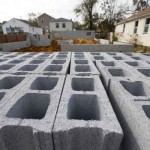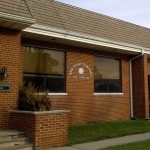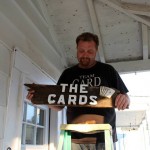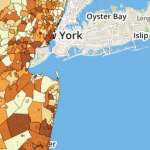Christie Administration Issues Generator Safety Advisory Ahead of Hurricane Sandy
State Fire Officials Warn of Electrocution Risk from “Backfeeding” of Power Lines
Trenton, NJ – New Jersey Department of Community Affairs (DCA) Commissioner Richard E. Constable, III today issued a warning to residents regarding the potential dangers of portable generators and “backfeeding” during power outages. An increase in the use of generators is expected with the arrival of Hurricane Sandy in the coming days, raising the importance of educating New Jerseyans on their proper and safe use.
Portable generators, widely used when power lines are down, can prove fatal to homeowners, utility workers and even your neighbors when used improperly. A generator connected to a home’s wiring or plugged into a regular household outlet can cause ‘backfeeding’ along power lines and electrocute anyone who comes in contact with them – even if the line seems dead.
‘Backfeeding’ happens when a portable generator is connected directly to the home’s wiring without having a functional transfer switch. Without a transfer switch, a portable generator’s electricity can be sent back into the power grid from your house. This will energize the utility’s power lines on the street and poses an electrocution hazard for those who may not know that the voltage is present on the shared lines.
The general public – as well as first responders – should assume that all power lines are energized and the risk of electrocution is high if proper measures are not observed.
“Even though power may be out in your immediate area, improperly connected portable generators are capable of ‘backfeeding’ power lines thought to be inactive,” said Commissioner Constable. “In addition, as the utility’s power is restored, your portable generator and house wiring may be severely damaged from improper usage.”
Acting Division of Fire Safety Director William Kramer, Jr., also warns that although portable generators can be very helpful to during outages, “it is imperative that the public follow safety guidelines when using one.”
Portable Generator Safety Tips:
- Never connect a generator directly to your home’s wiring unless your home has been wired for generator use. This can cause backfeeding along power lines and electrocute anyone coming in contact with them, including lineworkers making repairs. Have a licensed electrician install the equipment necessary to safely connect emergency generators to your home.
- Always plug appliances directly into generators. Connecting the generator to your home’s circuits or wiring must be done by a qualified, licensed electrician who will install a transfer switch to prevent backfeeding.
- Use heavy-duty, outdoor-rated extension cords. Make sure extension cords are free of cuts or tears and the plug has three prongs. Overloaded cords can cause fires or equipment damage.
- Ensure your generator is properly grounded.
- Never overload a generator. A portable generator should only be used when necessary to power essential equipment or appliances.
- Turn off all equipment powered by the generator before shutting it down.
- Keep the generator dry. Operate it on a dry surface under an open structure.
- Always have a fully charged fire extinguisher nearby.
- Never fuel a generator while it is operating.
- Read and adhere to the manufacturer’s instructions for safe operation. Never cut corners when it comes to safety.
The Division of Fire Safety serves as the central fire service agency in New Jersey. The Division is responsible for the development and enforcement of the State Uniform Fire Code, as well as for implementing public education and firefighter training programs.
For more information, log on to http://www.nj.gov/dca/divisions/dfs/ on the DCA website.











One other thought regarding portable generators…..try to avoid purchasing low end product. Like any other major purchase, you would want to know about warrenty, where can you go for servicing etc. Some of the better brands are Yamaha, Honda, Winco, Generac, Multiquip, etc
If you do not have a properly installed transfer switch (manual or automatic) you will need to run power cords from the generator to the appliance which also brings into play the tripping hazard.
Also, any generator needs to be placed outside the house at a safe distance. Keep the fuel away from the generator.
If power does go out, refueling cars and approved containers may be difficult.
Be careful, be safe.
Bob English nobody trusts you anymore. Please stick to political spin. Leave important life details to the experts.
To Anon:
Come on, keep politics out of this, this is too important an issue.
Bob is right about purchasing equipment – quality counts. I actually have a Generac generator.
Stay safe, everyone.
[…] to use your generators safely and properly. Governor’s Christie’s office issued a Gerenator Safety Advisory on Friday. You can find it here. Posted: October 29th, 2012 | Author: admin | Filed under: Hurricane Sandy | Tags: Generator won't […]
[…] Christie Administration Issues Generator Safety Advisory Ahead of Hurricane Sandy […]
Thank you for sharing this. It is very important the informations are being spread about the precaution for carbon monoxide poising and also fire that might be caused by our generators. This will help our fellow citizens to be aware and to take much precaution too.